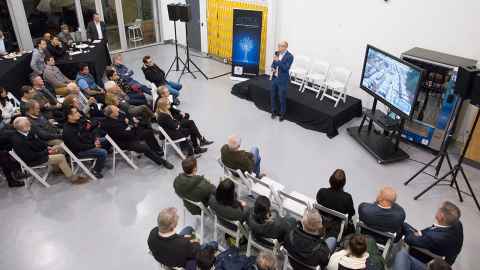Engineering event examines climate change preparedness
26 March 2019
The Auckland University Engineer’s Association (AUEA) hosted an event that investigated how prepared Auckland is for the potential impact of climate change.

The event was opened by Deputy Dean of Engineering Professor Gerard Rowe, who welcomed attendees to a “buzzing” campus that had recently been filled with over 3,400 students as the new semester gets underway.
Former Dean’s Leadership Programme Student Josh Lotter was the first speaker. He’s currently an Environmental Design Engineer at Pattle Delamore Partners, and presented a recent project where he investigated what rising sea levels may mean for the stormwater infrastructure at Auckland Airport.
Auckland Airport has a 30-year expansion plan to ensure it’s able to meet the growing demands of the city and its people. To find out how rising sea levels could factor into this, the project looked at models for eight stormwater pipes around the facility. Some of the predictions suggested that existing ponding levels could worsen, and both the domestic and international terminals may be subjected to greater flood risks.
Josh acknowledged that Auckland Airport is a business with responsibilities to its shareholders and the people who use it. However, he also noted the theme of “rising expectations” is apt, and that all critical infrastructure needs to be designed, built and managed in a way that preserves it for future generations.
Associate Professor in the Department of Civil Engineering Liam Wotherspoon spoke next, detailing the many ways different data sets can be compiled to create a shared understanding of how different infrastructure networks depend on each other. He believes being able to pull this data together and quantify infrastructure interdependencies is key to understanding how one network effects another and the population that relies on them.
Next was the panel discussion, which consisted of:
- Richard Reinen-Hamill, an expert in coastal edge design and assessment, natural hazard risk assessments, specialist peer reviewer and expert witness.
- Sarah Sinclair,Chief Engineer at Auckland Council and acting Director of Auckland Emergency Management
- Peter Mitchell from WSP Opus, Auckland Motorways Alliance, and the NZTA
The panellists were asked to detail impacts of climate change they have dealt with in their careers. Sarah talked about how the ways in which we impact climate change are a key focus for Auckland Council and are built into documents like the Unitary Plan. She noted that while it’s not always glamorous or exciting, it’s essential to ensure these overarching planning documents are supported by “good science”.
An audience member asked the panel how they think the next generation should be educated and how the tertiary sector and Engineering industry can better cooperate. Richard noted while there’s an ongoing tension between cost and value, one of the main challenges is collating good information on possible futures and outcomes.
Based on his experience working with Auckland’s complex motorway network, Peter sees value in engineers who are pragmatic; people who can create infrastructure that is reliably functional and readily available for the people who depend on it.
Civil Engineering remains the most popular specialisation in the faculty, with many undergraduates drawn to Environmental Engineering due to the potential challenges facing infrastructure here and throughout the rest of the world.